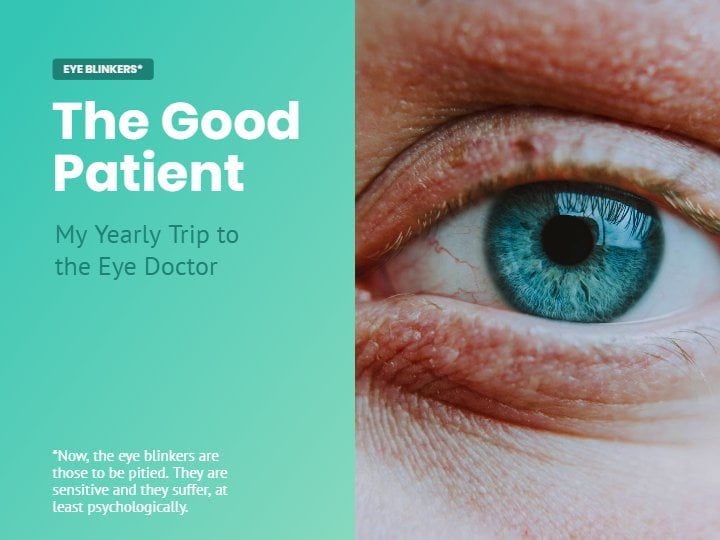The Good Patient
By Chaya Nessa Krycer

Of the many important traits to have, recognizing other people’s talents rates high on the list. Recently, I have become aware of a whole slew of abilities that should not be taken for granted. It all started on my yearly trip to the eye doctor.
Now, as we all know, there are many kinds of patients in the world. There are the ones that feel the need to mention every twitch in their body and be constantly reassured that feeling pain after stubbing a toe is not a sign of a terminal illness. Then there are those who complain about aggravating symptoms but refuse to implement any of the doctor’s recommendations for a drastic change in lifestyle.
Even more irritating are the patients who rebuff all instructions for maintaining a healthy lifestyle yet continue to lead lives brimming and overflowing with energy and well-being. The nerve of some people. They are the ones who make doctors look bad. (This reminds me of a true story. After ten years of ominous threats, a woman finally agreed to schedule a check-up with her dentist. His staff were bubbling over with glee, anticipating signs of completely rotten and cavity-filled teeth. Much to their astonishment, the woman’s teeth were exquisite, with nary an issue in sight. The practice was never the same. I believe the main dentist even retired a short while later).
As you can see, it is critical to fit the category of a ‘good patient’ so that our health professionals do not abruptly feel the need to retire. However, there is one patient not yet mentioned – one so rare that psychiatrists have yet to label and administer a fancy medication that promises to magically sweep this healthcare problem away. This small and distinct group is known as the eye blinkers.
What is the danger you ask? Really, to the average person, there is no danger. It may be difficult to apply eye make-up on occasion, and other than that the oddity cannot be detected. But, once they enter their eye doctor’s office everything changes. After making small talk with the receptionist, the patient is called back to the room where the monster, otherwise known as the eye puffer machine, lurks maliciously. The eye doctor’s assistant says that its purpose is to examine the eye – but we eye blinkers know the truth. Its real function is to terrorize eye blinkers into a state in which 99.99% of them can never recover.
There is a simple process an eye blinker must go through before completing the eye exam. First, the assistant goes over to the machine. The eye blinker closes her eyes. The assistant tells her to open her eyes. She makes a valiant effort and fails, just before the puffer puffs. The assistant refrains from pulling out his hair and goes in search of another assistant. But does it do any good? No. They decide to manually hold open the eye blinker’s eyelids. This makes it worse. (Evil giggle. Nothing good can come out of someone holding open your eyelids). As a last resort, they call the eye doctor himself to help manage this troublesome patient. She considers taking a few tranquilizers to calm her nerves, then remembers that an eye blinker comes under the category of ‘heavy machinery’ and decides against it. Somehow, the three of them, amidst the squirming, blinking, and general panic attacks of the eye blinker, can successfully puff the eye into submission. And now, it is time for the left eye . . . This is not the last of it. Thanks to the adaptation of eye drops, and other modern machines and medicines, this process repeats itself over and over until either the eye blinker or the optometrist fall into a dead faint.
Now, the eye blinkers are those to be pitied. They are sensitive and they suffer, at least psychologically. But their suffering is not half as great as the eye staff themselves, who must complete the eye exam before midnight while keeping a professional demeanor. The moral of the story is, as much as you may dread an appointment with your doctors, if you are the wrong kind of patient, they probably dread you even more. You may complain about the salary of those rich doctors who do not take your insurance so they can pay their chauffer and power their yacht. But they earn every cent of it from the turmoil, exasperation, and distress of their patients. It is indeed a great accomplishment, nay a gift, to fit neatly in the category of a good patient.



